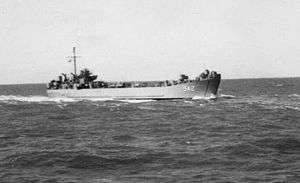USS LST-979
USS LST-979 was an LST-542-class tank landing ship in the United States Navy. Like many of her class, she was not named and is properly referred to by her hull designation.
 LST-542 underway c. 1951, same model as USS LST-979 | |
| History | |
|---|---|
| Name: | LST-979 |
| Builder: | Bethlehem-Hingham Shipyard, Hingham, Massachusetts |
| Yard number: | 3449[1] |
| Laid down: | 19 December 1944 |
| Launched: | 23 January 1945 |
| Sponsored by: | Mrs. A. H. Balsley |
| Commissioned: | 20 February 1945 |
| Decommissioned: | 5 July 1946 |
| Stricken: | 28 August 1946 |
| Identification: |
|
| Status: | Sold for scrapping, 4 November 1947 |
| General characteristics | |
| Class and type: | LST-542-class tank landing ship |
| Displacement: |
|
| Length: | 328 ft (100 m) oa |
| Beam: | 50 ft (15 m) |
| Draft: |
|
| Installed power: |
|
| Propulsion: |
|
| Speed: | 11.6 kn (21.5 km/h; 13.3 mph) |
| Range: | 24,000 nmi (44,000 km; 28,000 mi) at 9 kn (17 km/h; 10 mph) while displacing 3,960 long tons (4,024 t) |
| Boats & landing craft carried: | 2 x LCVPs |
| Capacity: | 1,600–1,900 short tons (3,200,000–3,800,000 lb; 1,500,000–1,700,000 kg) cargo depending on mission |
| Troops: | 16 officers, 147 enlisted men |
| Complement: | 13 officers, 104 enlisted men |
| Armament: |
|
| Service record | |
| Awards: | |
Construction
LST-979 was laid down on 19 December 1944, at Hingham, Massachusetts, by the Bethlehem-Hingham Shipyard; launched on 23 January 1945; sponsored by Mrs. A. H. Balsley; and commissioned on 20 February 1945,[3] with Lieutenant Hunter A. Hogan, Jr., USNR, in command.
Service history
Following World War II, LST-979 performed occupation duty in the Far East and saw service in China until late March 1946. She returned to the United States and was decommissioned on 5 July 1946, and struck from the Navy list on 28 August, that same year. On 4 November 1947, the ship was sold to the Moore Drydock Co., Oakland, California, for scrapping.[3]
Bibliography
Online resources
- "LST-979". Dictionary of American Naval Fighting Ships. Naval History and Heritage Command. Retrieved 27 June 2017.

- "Bethlehem-Hingham, Hingham MA". www.ShipbuildingHistory.com. 11 August 2011. Retrieved 27 June 2017.
- "USS LST-979". Navsource.org. 27 May 2016. Retrieved 27 June 2017.